The Middle East this Christmas : how dangerous a nation does democracy in America want to be?
Dec 7th, 2007 | By L. Frank Bunting | Category: USA Today Robert Kagan is the neo-conservative author of a US history called Dangerous Nation. He has argued that the United States is driven by its own unique “universalistic nationalism … Americans have never been isolationists … they have always gone out into the world to remake it in their own image.” And the Yale University historian Edmund S. Morgan has urged that “it is difficult not to read Dangerous Nation as historical justification for present positions” (with special reference to the Bush administration in the Middle East). Yet less than three weeks before Christmas 2007, Robert Kagan is now telling us that: “Regardless of what one thinks about the National Intelligence Estimate’s conclusion that Iran stopped its nuclear weapons program in 2003 … its practical effects are indisputable. The Bush administration cannot take military action against Iran.” In fact, it’s “Time to Talk to Iran.” This at least sounds more like a liberal than a neo-conservative conclusion. And from up here in the true north, as in many other parts of the global village, it is getting harder and harder to see just what is really going on in Washington, DC?
Robert Kagan is the neo-conservative author of a US history called Dangerous Nation. He has argued that the United States is driven by its own unique “universalistic nationalism … Americans have never been isolationists … they have always gone out into the world to remake it in their own image.” And the Yale University historian Edmund S. Morgan has urged that “it is difficult not to read Dangerous Nation as historical justification for present positions” (with special reference to the Bush administration in the Middle East). Yet less than three weeks before Christmas 2007, Robert Kagan is now telling us that: “Regardless of what one thinks about the National Intelligence Estimate’s conclusion that Iran stopped its nuclear weapons program in 2003 … its practical effects are indisputable. The Bush administration cannot take military action against Iran.” In fact, it’s “Time to Talk to Iran.” This at least sounds more like a liberal than a neo-conservative conclusion. And from up here in the true north, as in many other parts of the global village, it is getting harder and harder to see just what is really going on in Washington, DC?
Robert Kagan and John Bolton compared …
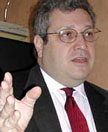 The point in this case is not that Robert Kagan’s analytic judgment about the real-world political power calculations induced by the new 2007 “NIE” in Washington is different from that of others who might still share neo-conservative ideological convictions.
The point in this case is not that Robert Kagan’s analytic judgment about the real-world political power calculations induced by the new 2007 “NIE” in Washington is different from that of others who might still share neo-conservative ideological convictions.
As Kagan spells these calculations out, in a December 5 column in the Washington Post, the NIE’s verdict that “Iran stopped its nuclear weapons program in 2003” means: “The Bush administration cannot take military action against Iran during its remaining time in office, or credibly threaten to do so, unless it is in response to an extremely provocative Iranian action. A military strike against suspected Iranian nuclear facilities was always fraught with risk. For the Bush administration, that option is gone.”
What’s more, Kagan goes on: “Neither ….will the administration make further progress in winning international support for tighter sanctions on Iran. Fear of American military action was always the primary reason Europeans pressured Tehran. Fear of an imminent Iranian bomb was secondary. Bringing Europeans together in support of serious sanctions was difficult before the NIE. Now it is impossible.”
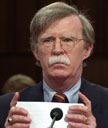 Whatever else, these raw Machiavellian power calculations are actually not much different from those finally conceded by George W. Bush’s former US ambassador to the United Nations, John Bolton, in a parallel December 6 Washington Post column.
Whatever else, these raw Machiavellian power calculations are actually not much different from those finally conceded by George W. Bush’s former US ambassador to the United Nations, John Bolton, in a parallel December 6 Washington Post column.
On the surface, Bolton spends much more time than Kagan detailing what he calls the “flaws” in the 2007 National Intelligence Estimate. Kagan himself agrees that “there is much to question in the report.” But he concentrates on the “practical effect” – which he sees as much more important.
Bolton too, however, after much questioning of the document, and the late 2007 political processes in Washington that it reflects, finally lands on much the same assessment of the practical effect as Kagan: “That such a flawed product could emerge after a drawn-out bureaucratic struggle is extremely troubling.” But, even so, even John Bolton goes on: “While the president and others argue that we need to maintain pressure on Iran, this intelligence’ torpedo has all but sunk those efforts … ”
 From a somewhat distant far northern non-neo-conservative point of view, all this is somewhat encouraging. It suggests that even aggressive neo-conservative ideologues can at least recognize the most elemental political and strategic realities, when they are pushed directly into their faces. (Unlike the former Yale University cheerleader, President G.W. Bush, who apparently does remain unrepentant in such matters – for better or worse, depending on who you are yourself.)
From a somewhat distant far northern non-neo-conservative point of view, all this is somewhat encouraging. It suggests that even aggressive neo-conservative ideologues can at least recognize the most elemental political and strategic realities, when they are pushed directly into their faces. (Unlike the former Yale University cheerleader, President G.W. Bush, who apparently does remain unrepentant in such matters – for better or worse, depending on who you are yourself.)
Yet what is striking about Robert Kagan’s final policy position here is how it ultimately does depart quite significantly from John Bolton’s. For his part, Mr. Bolton recognizes that the position on Iran President Bush still seems to be trying to hang onto will no longer work. But he finally thinks this simply means Iran has won. The “intelligence’ torpedo has all but sunk those efforts” of President Bush. And, alas: “Ironically, the NIE opens the way for Iran to achieve its military nuclear ambitions in an essentially unmolested fashion, to the detriment of us all.”
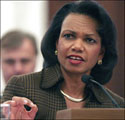 Robert Kagan, on the other hand, draws a quite different policy conclusion. It may have been better for the future of the dangerous nation that is America – and whatever other parts of the global village today may actually still admire its “universalistic nationalism,” if the 2007 NIE had never seen the light of day. Mr. Kagan seems to imply. But it has seen the light of day.
Robert Kagan, on the other hand, draws a quite different policy conclusion. It may have been better for the future of the dangerous nation that is America – and whatever other parts of the global village today may actually still admire its “universalistic nationalism,” if the 2007 NIE had never seen the light of day. Mr. Kagan seems to imply. But it has seen the light of day.
And now, Kagan writes: “With its policy tools broken, the Bush administration can sit around isolated for the next year. Or it can seize the initiative, and do the next administration a favor, by opening direct talks with Tehran … Negotiating will appear at first to be a sign of weakness … But there is a good case for negotiations … Eventually, the United States will have to take the plunge, as it has with so many adversaries throughout its history.”
The Kagan family tree … and Michael O’Hanlon … and some key Democrats too?
 It is this last willingness to consider the policy option of “opening direct talks with Tehran” – as an alternative to the now impossible military-and-sanctions scenario of the Bush administration – that makes Robert Kagan almost sound like a neo-conservative who has suddenly stumbled into some liberal fire station by mistake. And in trying to understand all this it helps to look briefly into what might be called the wider Kagan family background.
It is this last willingness to consider the policy option of “opening direct talks with Tehran” – as an alternative to the now impossible military-and-sanctions scenario of the Bush administration – that makes Robert Kagan almost sound like a neo-conservative who has suddenly stumbled into some liberal fire station by mistake. And in trying to understand all this it helps to look briefly into what might be called the wider Kagan family background.
Robert Kagan, that is to say, is the brother of Frederick and the son of Donald Kagan. All three have been “closely associated with the neoconservative project” in the USA today. And, without at this time going further into this intriguing family tree, it is enough to note that back some three weeks ago, on November 18, Frederick W. Kagan and Michael O’Hanlon published a piece in the New York Times entitled “Pakistan’s Collapse, Our Problem.”
I myself found this piece on Pakistan notable for its strong and overly optimistic dangerous-nation assumptions about the present capacity of pre-emptive non-isolationist Americans today to go “out into the world to remake it in their own image.” If the current US War in Iraq teaches anything, I would have thought (like its more ancient predecessor in Vietnam, which people my age are alas old enough to still remember), it is that the neo-conservative American dream about the practical ability of the United States, or any other country, to remake the current very turbulent global village in its own image is, apart from anything else, wildly unrealistic.
 As just a taste of the argument here, Kagan and O’Hanlon allow that the “task of stabilizing a collapsed Pakistan is beyond the means of the United States and its allies.” But they then go on to urge that “if we have any hope of success, we would have to act before a complete government collapse, and we would need the cooperation of moderate Pakistani forces.”
As just a taste of the argument here, Kagan and O’Hanlon allow that the “task of stabilizing a collapsed Pakistan is beyond the means of the United States and its allies.” But they then go on to urge that “if we have any hope of success, we would have to act before a complete government collapse, and we would need the cooperation of moderate Pakistani forces.”
Their argument continues: “One possible plan would be a Special Forces operation with the limited goal of preventing Pakistan’s nuclear materials and warheads from getting into the wrong hands. Given the degree to which Pakistani nationalists cherish these assets, it is unlikely the United States would get permission to destroy them. Somehow, American forces would have to team with Pakistanis to secure critical sites and possibly to move the material to a safer place.”
All human history we know of, it seems to me, as one ordinary citizen who tries to stay informed about the wider North American public interest and so forth, shows that calculations of this sort just do not work in the real world (as opposed to James Bond novels or Mike Myers movies, etc).
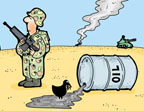 Kagan and O’Hanlon are closer to the truth, I think, when they observe that “stabilizing a collapsed Pakistan is beyond the means of the United States and its allies” because “a force of more than a million troops would be required for a country of this size.” Mercifully, democracy in America today is not prepared to put a million troops anywhere in the Middle East. (And no doubt that would finally not altogether work either, in the post-imperial age of the democratic global village – that democracy in America itself happily promotes.)
Kagan and O’Hanlon are closer to the truth, I think, when they observe that “stabilizing a collapsed Pakistan is beyond the means of the United States and its allies” because “a force of more than a million troops would be required for a country of this size.” Mercifully, democracy in America today is not prepared to put a million troops anywhere in the Middle East. (And no doubt that would finally not altogether work either, in the post-imperial age of the democratic global village – that democracy in America itself happily promotes.)
The crucial point in all this for my current meditations here, however, is that the Michael O’Hanlon who is Frederick Kagan’s co-author in “Pakistan’s Collapse, Our Problem” cannot be quite accurately described as a fellow neo-conservative. And that may finally help explain why Frederick Kagan’s neo-conservative brother Robert sometimes sounds a lot like a liberal in his December 5 Washington Post piece on “Time to Talk to Iran.”
More exactly, O’Hanlon has been described as a “prolific writer and frequently cited expert on US defense and security issues” and “a senior fellow at the centrist Brookings Institution.” The same description more intriguingly carries on: “Although a Democrat with a generally realist approach to foreign affairs, O’Hanlon has in recent years supported a number of interventionist policies promoted by hardline factions like the neoconservatives, including the Iraq troop surge’ policy announced by the George W. Bush administration in early 2007.”
 As Christmas 2007 draws near – full of many confusing events in the Middle East and many other parts of the world (Animist, Buddhist, Christian, Confucian, Hindu, Islamic, Jewish, Zoroastrian, and on and on alike) – all this may remind us that it is not just Republicans in the USA today who still retain attachments to dangerous-nation assumptions about the present capacity of pre-emptive non-isolationist Americans to go “out into the world to remake it in their own image.”
As Christmas 2007 draws near – full of many confusing events in the Middle East and many other parts of the world (Animist, Buddhist, Christian, Confucian, Hindu, Islamic, Jewish, Zoroastrian, and on and on alike) – all this may remind us that it is not just Republicans in the USA today who still retain attachments to dangerous-nation assumptions about the present capacity of pre-emptive non-isolationist Americans to go “out into the world to remake it in their own image.”
Even just on television from up here in the far north, you can notice that noises of a similar sort have been made lately by a variety of Democrats (which is also something, e.g., that Michael O’Hanlon continues to be). And then it seems still more intriguing that on December 5, 2007 – the same day that Robert Kagan was arguing it was “Time to Talk to Iran” (rather than dropping bombs on the place, as some have urged) – Michael O’Hanlon was arguing that Democrats should be starting to think about “A New Course in Iraq.”
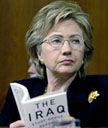 More exactly, Mr. O’Hanlon was arguing: “On strategic grounds, it appears that we now have an opportunity to salvage something significant in Iraq … this almost surely requires us to execute a gradual drawdown of U.S. forces there rather than an abrupt departure. In political terms, it would be rescuing defeat from the jaws of victory to mandate an end to an operation, however unpopular, just when it is showing its first signs of progress … Democrats should change course. Rather than demand an end to the operation no matter what, they should continue to keep up the pressure for positive results in Iraq.”
More exactly, Mr. O’Hanlon was arguing: “On strategic grounds, it appears that we now have an opportunity to salvage something significant in Iraq … this almost surely requires us to execute a gradual drawdown of U.S. forces there rather than an abrupt departure. In political terms, it would be rescuing defeat from the jaws of victory to mandate an end to an operation, however unpopular, just when it is showing its first signs of progress … Democrats should change course. Rather than demand an end to the operation no matter what, they should continue to keep up the pressure for positive results in Iraq.”
Mmmm … some will say. Now we have neo-conservatives sounding like liberals, and liberals sounding like neo-conservatives. What on earth is going on inside the beltway in Washington?
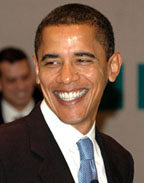 Others will no doubt say that Michael O’Hanlon never has really been any serious kind of liberal – even if he does belong to the Democratic Party. (And for all I know still others might say that Robert Kagan and/or his brother and/or father never really have been neo-conservatives.)
Others will no doubt say that Michael O’Hanlon never has really been any serious kind of liberal – even if he does belong to the Democratic Party. (And for all I know still others might say that Robert Kagan and/or his brother and/or father never really have been neo-conservatives.)
However you look at it, 2008, it would seem, is indeed going to be quite an interesting year for democracy in America. And we will as usual be watching carefully up here in the far north too – with our sort-of neo-conservative minority prime minister, and a cosmopolitan deputy leader of the liberal opposition of whom Michael O’Hanlon would almost certainly approve.

